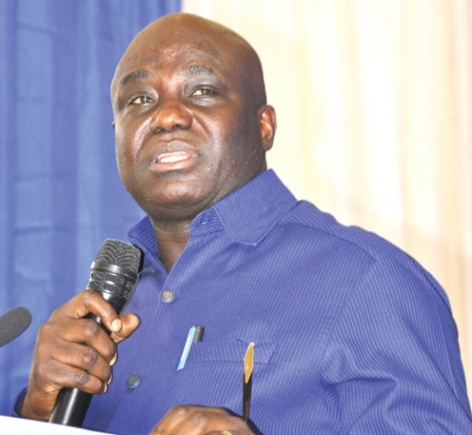The government has secured €47 million from the European Union to aid irrigation farming in the country, the Minister of Agriculture, Eric Opoku, has announced.
He said the move was to ensure all-year round food production on farmlands.
Mr Opoku who disclosed this at the opening of a two-day conference on food, agriculture, technology and sustainability at the Ho Technical University in the Volta Region last Monday, described as unfortunate how only 12 per cent of the 1.9 million hectares of irrigable land available in the country was being utilised for that purpose.
Conference
The conference which was attended by about 200 stakeholders, including farmers, agribusiness leaders, students and members of the public, was on the theme; “Rethinking the future of food and its allied systems in an era of sustainability and circularity.”
![]()
A section of the participants
Some of the topics discussed included: ‘The unexplored value of cotton: A case study of Ghana’s cotton value chain; Closing the loop: Innovative circular strategies to slash food loss and waste across supply chains; Access to quality mechanisation services and Gender inclusion in the Volta and Oti regions.
Mr Opoku reiterated the call on the youth to embrace farming because the future of the agricultural sector was very bright with guaranteed returns.
He said the GH¢800 million fund set aside to fix roads connecting farming communities was another sterling move to reset the agriculture sector.
In that regard, Mr Opoku said the government would support all second cycle institutions to have viable school farms.
“Let the universities also demonstrate their research findings on the fields to support crop yields,” Mr Opoku added, and entreated churches to be part of the Feed Ghana Programme by focusing on farming to ensure a holistic approach to saving souls beyond the spiritual aspect.
Human capital
A professor of Plant Molecular Genetics at the University of Ghana, Professor Eric Yirenkyi Danquah, said Ghana had enough human capital to farm to ensure food security.
Professor Danquah observed that to produce a good food system in the country, universities must rather focus on quality courses and not large enrolments.
He, therefore, urged the government to willingly release funds to the universities for their research work in food production in the broader national interest.
“Agriculture is not limited to production but extends to the entire value chain,” he added.
The Volta Regional Minister, James Gunu, for his part, assured that the Regional Coordinating Council (RCC) was ready to collaborate with the Ho Technical University to realise high food production and security on the fields.
A Professor of Postharvest Technology at the Kwame Nkrumah University of Science and Technology (KNUST), Professor Obok Oduro, who also graced the conference said more food than ever was being produced in the country, yet Ghanaians still struggled to eat balanced meal.
She said recent national food security and nutrition analysis showed that 3.2 million citizens faced food insecurity, particularly in the Northern, Savannah and Eastern regions.
Professor Oduro said a vigorous rethinking was required to empower citizens to address those problems.

